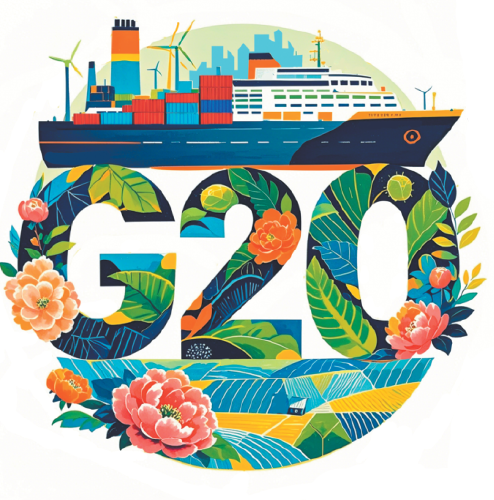2024-11-26
 Brazil's G20 Summit Charts a New Course for Global Cooperation
Brazil's G20 Summit Charts a New Course for Global Cooperation
In November 2024, the world turned its attention to South America. On November 19, the two-day G20 Summit concluded successfully in Rio de Janeiro, Brazil. This marked the first time Rio hosted the G20 Summit and Brazil's second turn as host since 2018. Under the theme "Building a Fair World and a Sustainable Planet," leaders from major global economies engaged in in-depth discussions on topics such as social inclusion and eradicating hunger, energy transition, sustainable social, economic, and environmental development, and reforming global governance institutions.
As host, Brazil used this opportunity to showcase its leadership and influence as a South American powerhouse. Brazilian President Luiz Inácio Lula da Silva stated, "The G20 is not only a platform to address global challenges but also a stage to highlight the vibrancy of South America's economies. Brazil will promote global cooperation with openness and innovation, ushering in a new phase of collaboration." During the summit, Brazil signed multiple cooperation agreements with various countries, further cementing its growing role in global economic governance.
The G20, as the most influential multilateral mechanism for economic cooperation, bears a vital mission in coordinating international economic policies and addressing global challenges. Against a backdrop of uncertain global economic recovery, the urgency of climate change, and supply chain disruptions caused by geopolitical conflicts, these issues became the focal points of the summit.
The summit concluded with the adoption of the "Rio Action Plan," covering areas such as global debt relief, the establishment of a Green Energy Fund, and securing food supply chains. The plan aims to provide more stable and inclusive pathways for global economic development. Notably, it underscores greater opportunities for emerging economies and developing nations to enhance their voice in global economic governance.
China played a prominent role in this G20 Summit, demonstrating its leadership in the global economy. Chinese leaders proposed a series of initiatives centered on "developing the digital economy, advancing green development, and promoting global poverty alleviation," injecting fresh momentum into global economic growth. China reaffirmed its commitment to deepening partnerships under the Belt and Road Initiative (BRI), advancing infrastructure projects, and fostering high-level trade and economic cooperation.
Data from the first three quarters of 2024 show that trade between China and G20 members grew by 12.6% year-on-year, highlighting China's pivotal role in global supply chains. Additionally, China announced increased investment in emerging markets, including support for protecting Brazil's Amazon rainforest, establishing the China-Brazil Climate Fund, and implementing digital economy cooperation projects across Latin America. President Lula praised China's contributions, stating, "China's active participation brings hope to global economic governance and injects new vitality into Brazil and Latin America."
Brazil is a key partner for China in Latin America and an important member of BRICS. During the summit, China and Brazil achieved several breakthroughs, including the signing of an upgraded free trade agreement and commitments to deepen cooperation in renewable energy, agricultural technology, and digital infrastructure. The jointly developed "Rio Smart Port" project officially became operational, positioning the port as a vital logistics hub between South America and Asia, significantly reducing shipping times and enhancing trade efficiency.
In a noteworthy initiative, China and Brazil also launched the "Latin America Sustainable Development Plan," aimed at supporting Brazil and other Latin American nations in achieving green transitions and emissions reduction through technology transfer and financial assistance. A Brazilian government official noted, "This plan not only deepens Sino-Brazilian cooperation but also ensures that Latin America occupies a vital position in the global green economy."
The Rio de Janeiro G20 Summit was not only a highlight for Brazil but also a milestone for the broader Latin American region's emergence on the global stage. Historically marginalized in the global economic system, Latin America has recently demonstrated robust economic recovery, buoyed by growing trade ties with the Asia-Pacific region.
The International Monetary Fund predicts that Latin America's economy will grow by 3.2% in 2024, a notable improvement from last year. This growth is attributed to the region's active participation in international cooperation and efforts to accelerate internal economic integration. The G20 Summit provided a rare opportunity for Latin America to secure more international resources and influence, laying the foundation for the region to become a new engine of global economic growth.
The 2024 G20 Summit in Rio de Janeiro marks the beginning of a new era in global economic governance. Under Brazil's leadership, the roles of developing countries and emerging economies have become more prominent, and global cooperation has increasingly shifted toward multipolarity.
For China and Latin America, this summit opens a new chapter of collaboration. Through initiatives like the Belt and Road, green economy projects, and digital transformation, Sino-Brazilian relations will continue to deepen, enabling Latin America to play a larger role in the global economy. As South-South cooperation strengthens, the world is poised to embrace a more equitable, inclusive, and sustainable multipolar era.